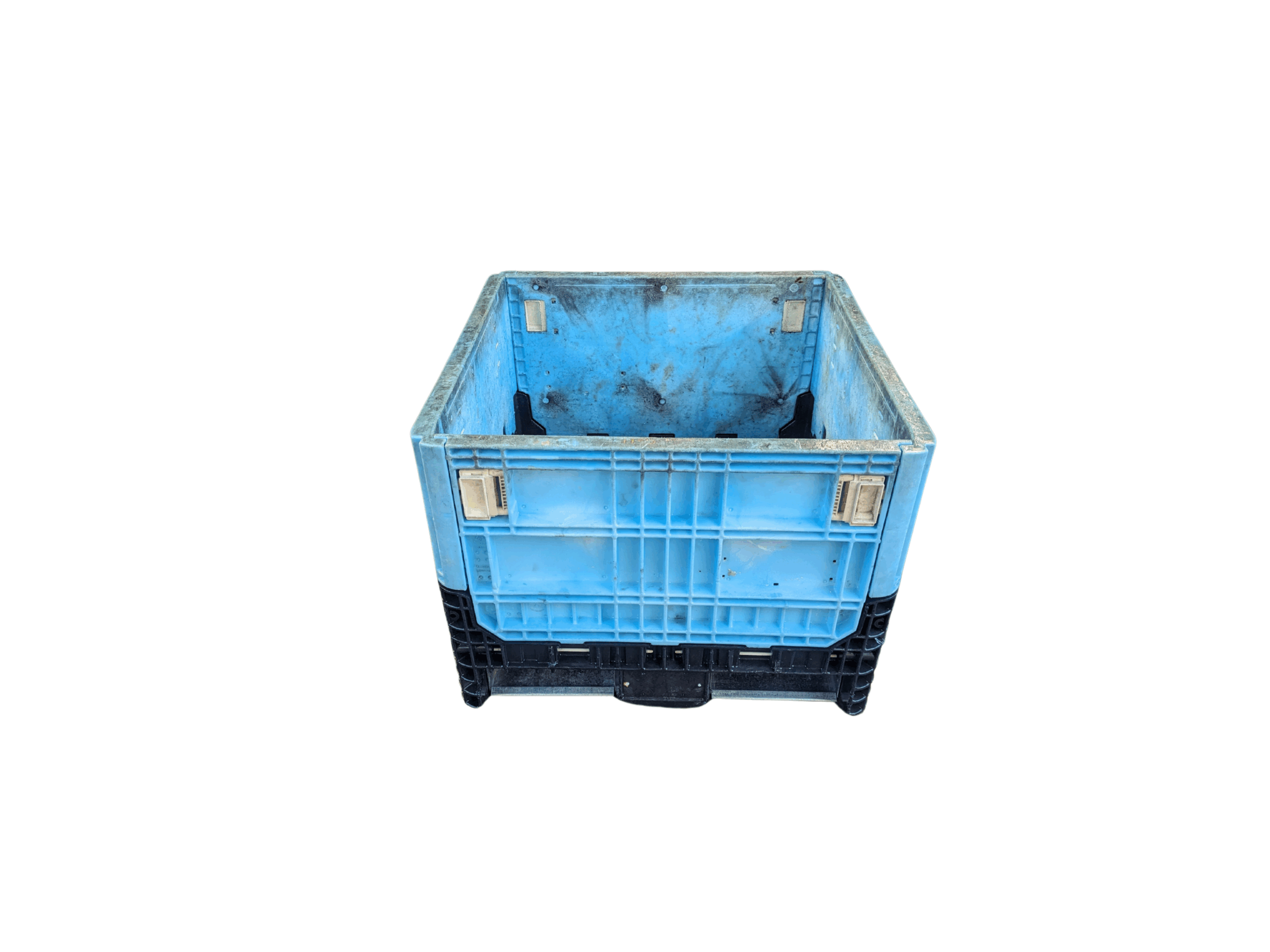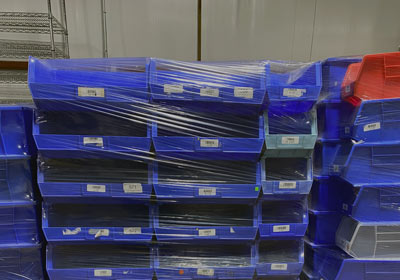Top reasons to choose used bulk containers for sustainable business operations
Wiki Article
The Ultimate Overview to Picking the Right Bulk Containers for Your Organization Needs
Picking the ideal bulk containers is critical for any kind of business that counts on effective logistics. Different types of containers exist, each designed for specific products and applications. Variables such as size, material compatibility, and regulatory standards play a significant duty in this decision-making procedure. Recognizing these aspects can lead to enhanced operational performance. Nevertheless, several businesses neglect necessary facets that can boost their general efficiency and sustainability. What are these factors to consider?Recognizing Various Sorts Of Bulk Containers
Mass containers function as important devices for organizations seeking reliable storage space and transport remedies. These containers are available in different kinds, each designed to fulfill particular functional needs. One typical kind is the intermediate mass container (IBC), which is perfect for fluid and granulated products, supplying a balance of capability and ability to move. One more popular choice is the mass bag, or FIBC, ideal for completely dry, flowable items. These versatile containers are lightweight and can be quickly delivered and saved. For larger materials, inflexible bulk containers are often used, supplying sturdiness and security for secure handling. Furthermore, there are specialized containers tailored for unsafe materials, guaranteeing conformity with safety and security policies. Understanding the distinctive qualities of these mass container types permits businesses to make educated decisions that enhance logistics and reduce expenses. By picking the appropriate container, business can boost their functional effectiveness and streamline their supply chain procedures.Key Material Considerations for Mass Containers
When choosing bulk containers, it is vital to contemplate the materials made use of in their building. Factors such as stamina, sturdiness, and chemical compatibility play a critical function in making sure the containers satisfy particular functional requirements. In addition, weight and portability issues can influence both effectiveness and transportation logistics.Material Sturdiness and Stamina
Durability and strength are critical elements in picking products for mass containers, as they straight affect the container's capability to withstand different environmental conditions and taking care of procedures. Materials such as high-density polyethylene (HDPE), polypropylene, and stainless steel are generally preferred for their durable residential properties, providing resistance to temperature level, abrasion, and influence changes. The choice of product likewise impacts the overall lifespan of the container; more powerful products commonly cause less constant substitutes, leading to cost financial savings gradually. Furthermore, the weight of the material can impact shipping prices and simplicity of handling. Services need to consider their specific operational settings and the possibility for deterioration to ensure peak toughness and strength in their bulk container option.Chemical Compatibility Factors
Understanding chemical compatibility is necessary for picking mass containers, as the products used should resist the details materials they will certainly hold. Various factors affect compatibility, consisting of the chemical nature of the materials, temperature level, and duration of storage space. Corrosive chemicals might call for containers made from stainless steel or specialized plastics that withstand degradation. Furthermore, responsive compounds can generate warm or gases, necessitating vented or pressure-rated containers. The selection of container product, whether polyethylene, polycarbonate, or steel, need to straighten with the chemical residential or commercial properties of the stored materials to avoid violations or leaks. Eventually, a complete evaluation of these compatibility aspects ensures safe handling and storage space, protecting both personnel and the setting while preserving product integrity.Weight and Transportability Concerns
Picking bulk containers entails not only assessing chemical compatibility yet likewise taking into consideration weight and mobility. Companies must examine the convenience of handling and transport to maximize efficiency. Light-weight materials like high-density polyethylene (HDPE) or light weight aluminum can assist in easier movement and decrease delivery prices. On the other hand, heavier containers might give boosted toughness but can impede movement, particularly in atmospheres calling for regular relocation. Furthermore, the design of the container ought to enable hassle-free training and piling, making sure ergonomic security for employees. Companies need to additionally take into consideration the framework available for transportation; for instance, containers suitable with forklifts or pallet jacks can improve procedures. Inevitably, the appropriate balance between weight and mobility directly affects operational performance and expense efficiency.Sizing Your Mass Containers for Ideal Performance
When sizing bulk containers, organizations need to thoroughly evaluate the dimensions required to fit their certain products. Additionally, weight capacity is a crucial factor that affects effectiveness and safety during transportation and storage. Reliable sizing not just makes best use of room yet additionally optimizes operational process.Figuring Out Container Dimensions
Selecting the best dimensions for mass containers is essential for making the most of performance in storage and transport. Companies should examine their specific demands, considering elements such as offered space, the additional reading nature of the goods being stored, and the methods of transportation utilized. Precise measurements guarantee that containers fit preferably in warehouses and vehicles, decreasing thrown away area and minimizing dealing with time. Standard sizes can offer convenience, yet personalized measurements may be needed for unique needs or to fit particular products. Furthermore, it is very important to examine stacking capacities and accessibility, as these elements influence total operational effectiveness. Inevitably, the right measurements result in boosted organization and structured logistics, benefiting the general productivity of the business.Weight Ability Considerations
Understanding weight capacity is vital for organizations intending to enhance Click This Link their bulk container effectiveness. The weight capability of a container straight affects storage capacities, transport logistics, and general functional costs. Selecting containers with the appropriate weight limitations guarantees that businesses can safely save and move their items without taking the chance of damages or conformity issues. Overwhelming containers can lead to structural failures, while underutilizing ability cause lost sources. It is very important for services to examine their product weights and consider any type of regulative needs when picking containers. Furthermore, aspects such as the sort of product, meant use, and ecological problems must likewise affect weight capability choices. By assessing these elements, companies can improve effectiveness and ensure a structured supply chain.Governing Conformity and Safety And Security Criteria

Regulative conformity and safety criteria play an important duty in the option of bulk containers for businesses. Organizations has to ensure that their containers satisfy numerous policies set by neighborhood, national, and worldwide authorities. These requirements commonly concern product safety, structural integrity, and correct labeling, which aid stop crashes and assure the secure transportation of products.
Furthermore, adherence to industry-specific standards, such as those from the Fda (FDA) or the Occupational Security and Wellness Administration (OSHA), is critical for firms taking care of harmful materials or foodstuff. Non-compliance can cause fines, legal problems, or damages to a business's track record.
Organizations must also think about the container's compatibility with the materials being saved or transferred to stay clear of contamination or chain reaction (refurbished bulk containers). To summarize, recognizing and executing regulatory compliance and safety and security criteria is crucial for the liable and reliable use bulk containers
Sustainability Alternatives for Eco-Friendly Mass Containers

Companies are likewise checking out options made from recycled products, which not just save sources but also support the reusing market. Furthermore, technologies in style enable for lighter containers that call for less energy to transport, even more enhancing sustainability. By incorporating these green mass container alternatives, organizations can demonstrate their commitment to environmental stewardship while meeting consumer need for lasting techniques. This shift not just assists the world but can likewise improve brand credibility and client loyalty.
find out
Cost-Effectiveness and Budgeting for Mass Containers
While lots of businesses concentrate on sustainability, cost-effectiveness remains an essential element when picking bulk containers. Organizations has to examine the initial acquisition cost, as well as long-term functional prices, to assure monetary stability. Elements such as reusability, upkeep, and resilience play a significant role in establishing overall expenses.Spending in high-grade containers might generate greater upfront expenses but can lead to cost savings via lowered replacement rates and lowered waste. In addition, businesses need to take into consideration transportation costs and storage efficiency, as these can impact the total spending plan.

Regularly Asked Concerns
Just how Do I Figure Out the Right Container for Hazardous Products?
To establish the right container for harmful materials, one need to evaluate compatibility with the substance, consider the container's material, check for governing compliance, and evaluate capability and security features to ensure appropriate handling and storage space.Can Bulk Containers Be Customized for Particular Products?
Yes, bulk containers can be tailored for certain products. used plastic containers. Different functions, such as layout, product, and size, can be tailored to meet unique needs, making sure ideal security and performance for moving and keeping different goodsWhat Is the Ordinary Life-span of Different Bulk Container Types?
The typical lifespan of mass container kinds differs; plastic containers last 5-10 years, metal containers 10-20 years, and wood containers normally last 3-7 years, relying on usage, maintenance, and ecological conditions.Just how Should I Tidy and Maintain Mass Containers?
To cleanse and maintain bulk containers, one should consistently check for damages, get rid of deposit, laundry with ideal detergents, wash extensively, and warranty appropriate drying out before storage space. Adhering to supplier standards enhances durability and safety and security throughout use.Exist Rental Options for Bulk Containers Available?
Yes, many business offer rental choices for mass containers, supplying flexibility for businesses. These services can fit numerous demands, allowing companies to manage supply efficiently without the dedication of purchasing containers outright.Toughness and stamina are important factors in choosing materials for mass containers, as they directly influence the container's capability to hold up against various environmental problems and handling procedures. Understanding chemical compatibility is essential for picking mass containers, as the products used must resist the details materials they will certainly hold. Recognizing weight capacity is crucial for services intending to enhance their mass container efficiency. Regulative compliance and security standards play a crucial duty in the option of mass containers for businesses. While numerous organizations focus on sustainability, cost-effectiveness remains a crucial aspect when picking bulk containers.
Report this wiki page